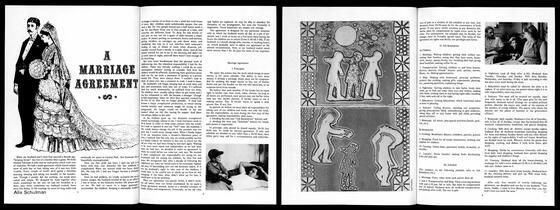Alix Kates Shulman
My “Marriage Agreement” was first published in the small feminist journal Up From Under in 1970. The radical feminist idea it embodied was so controversial that it was reprinted (and sometimes misprinted) in Life, Redbook, Ms., a Harvard textbook on contract law, and many an anthology. For decades it has been loudly debated, championed, and ridiculed – right up until last year, when it was attacked anew in The Atlantic and subsequently defended in that magazine’s Letters columns.
The idea was simply this: that a woman and man should share equally the responsibility for their household and children in every way, from the insidiously unacknowledged tasks of daily life to the pleasures of guiding a young human to maturity.
This explosive idea went completely against the conventions of that era. At the time I wrote my “Marriage Agreement,” child care and household management were considered exclusively a woman’s responsibility. What made the idea radical were the Principles. The rest of the Agreement was my attempt to stir up public consciousness by naming some of the hidden tasks, so often considered trivial, that are taken for granted in the traditional divisions of household labor. Today, in an era of two-earner families with the attendant problems of the Second Shift and rampant overwork, someone searching among the data of daily life might come up with a different list of tasks and inequities from mine. But the Principles remain – and continue to sting – despite the fact that now, more than three decades later, the idea of equal marriage is widely accepted, like many other feminist ideas. Some people nowadays try valiantly to live by it, while many others pay it lip service, even while managing to avoid its practical consequences.
The idea’s limited success is hardly surprising, given the economic, social, and psychological arrangements that continue to impede equality, in marriage and out. Such strains doomed my own marriage, along with half the marriages in America. Probably not until the polity is more child- and woman-friendly, not until men and women are equally valued – economically and otherwise – not until free or low-cost quality childcare is universally available, will the ideal of equality in marriage be other than radical.
Alix Kates Shulman was born in Cleveland, Ohio, in 1932. At age 20, she moved to New York City to study philosophy and mathematics. In the 1960s, she became a political activist and writer. An early member of the radical feminist group Redstockings, Shulman’s activism has ranged from planning the 1968 Miss America Pageant Protest, which was the first national demonstration of women’s liberation, to founding a Hawaii branch of the abortion rights group No More Nice Girls. Beginning with the pioneering feminist novel Memoirs of an Ex-Prom Queen, her writings, hailed by The New York Times as “the voice that has for three decades provided a lyrical narrative of the changing position of women in American society,” include novels, memoirs, biography, and children’s books. Her memoir Drinking the Rain was a finalist for the Los Angeles Times Book Prize and received a Body Mind Spirit Award of Excellence. She has taught at the universities of Hawaii, Colorado, New York, Arizona, Yale, and New School.





This is a great article. I teach it in my feminist theories classes